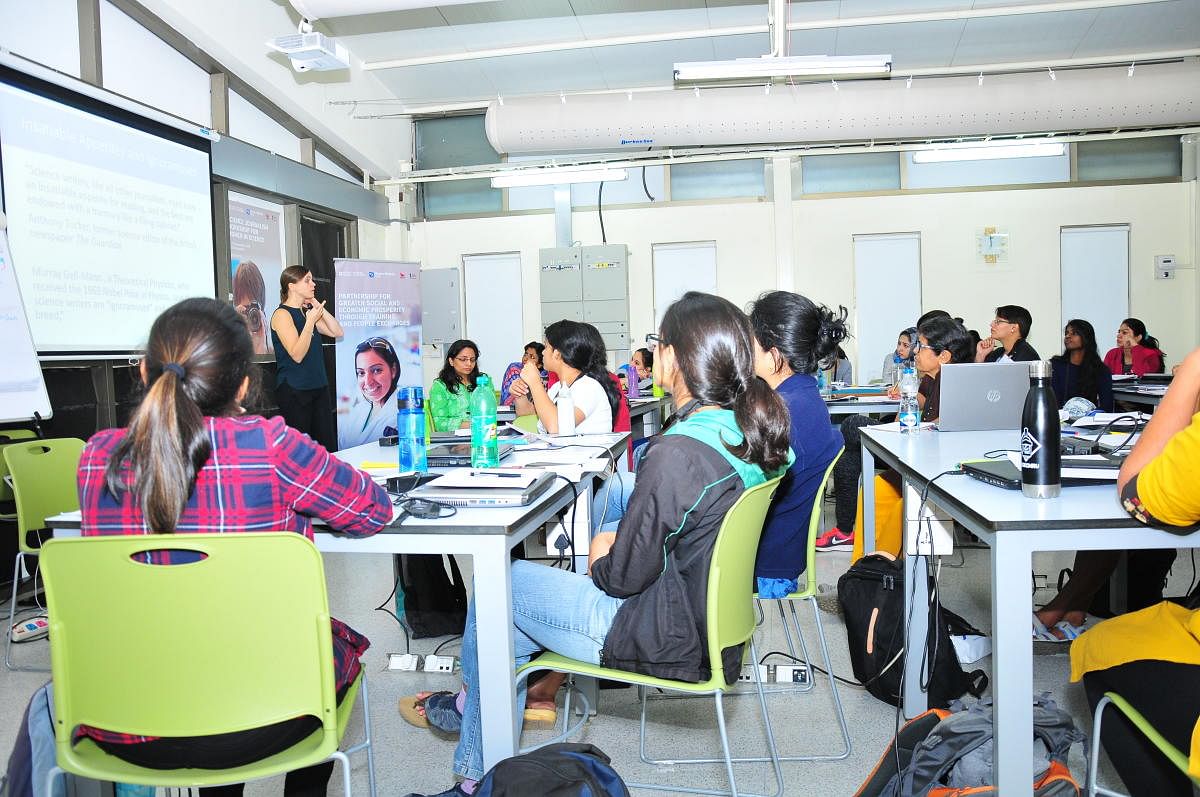
After spending years in teaching and research at a college of Pharmacy in Andhra Pradesh, when Dr S Mohana Lakshmi was promoted to an administrative role she felt unsure of executing her new responsibilities. “I was one of the few women in senior positions in the institute. So, I was part of all administration-related committees in the college. It was very challenging to work in a male-dominated environment like that. I would usually keep quiet in meetings,” she said.
That is no longer the case, Mohana Lakshmi said, with confidence. In the five years since she took charge as vice principal, she has made a conscious attempt to improve her administrative skills. Among the other workshops she has attended, Lakshmi found the workshop on Science Administration organised by the British Council to be the most helpful.
The British Council in India has been conducting several programmes and initiatives to encourage women in STEM fields. STEM stands for Science, Technology, Engineering, and Mathematics, all fields in which the participation of women has been lower than that of men.
To develop skills
To tackle this, the Council set up the Newton-Bhabha Fund for women scientists. The purpose is to develop leadership skills among women scientists and to provide them with the opportunity to pursue different careers in science. Since 2016, the programme has trained over 220 scientists through workshops in Science Administration & Management, Science Policy, and Science Journalism. The workshops are conducted in partnership with the Indian Institute of Science Education and Research, Pune (IISER- Pune).
Mohana Lakshmi attended the workshop on Science Administration at IISER-Pune and found it to be exactly what she needed. What she enjoyed best was interacting with other dynamic women in leadership roles in the field of science. “It is always challenging for women in senior positions so it was nice to meet other women and share our experiences. I have more confidence to execute my responsibilities now,” Mohana Lakshmi said.
While the administration workshops are aimed at upskilling women scientists and preparing them for leadership roles, the science journalism and communication workshops are intended to showcase new career prospects.
In an email response, Janaka Pushpanathan, South India Director of the British Council explained, “The workshop aims to help develop skills and provide access to opportunities for women who transition from science education to a career in science with the objective of retaining them in the STEM fields through newer avenues. Science journalism and communication has come up as an exciting new area.”
After completing her PhD, Bhavya Khullar was wondering what to do next when she stumbled upon the science journalism workshop. The activities and interactions during the programme gave her confidence and improved her writing skills. Though she had not known much about the field before, Bhavya is now going full steam ahead in her career in science journalism with regular articles appearing in print and digital publications.
Science journalism
The workshop has been beneficial even for those who don’t necessarily want to become science journalists. Sai Harshini Tekur always nursed an interest in writing from when she was a student.
Later, she moved on to complete her Masters and PhD in Physics. “I didn’t take writing seriously, it was just something I liked doing. So, when I came across this workshop it seemed natural to take part,” Harshini said. The workshop helped her get clarity in her writing and gave her useful tips to improve her academic writing.
“The best thing was that I got to meet women who are doing different things in Science. It gave me a lot of perspectives. I have just finished my PhD now and I intend to continue in academics. Though I won’t pursue science journalism full-time, I do want to be involved in science communication,” Harshini said.
The workshops are held annually in two levels, with a selected group of women getting to take part in the second, more advanced level. Although the science journalism workshop is not about academic writing, many women scientists have been using the skills from these trainings to write scientific papers.
Bhavana Harsh Paraliker is a microbiologist. “As part of my job, I have to write several academic papers, scientific reports and make presentations to clients. My institute’s director suggested that I attend the workshop,” Bhavana said.
The sessions helped her understand how to communicate her work effectively and in simple language. “Even though I am not applying the training directly into science journalism, I can definitely see the difference. I am able to communicate better with my clients,” she said.
The Newton-Bhabha Fund is part of the British Council’s effort to work towards achieving Sustainable Development Goal (SDG) 5 of the United Nations. The goal, considered key to fulfilling the other SDGs, is to achieve gender equality and to empower women.